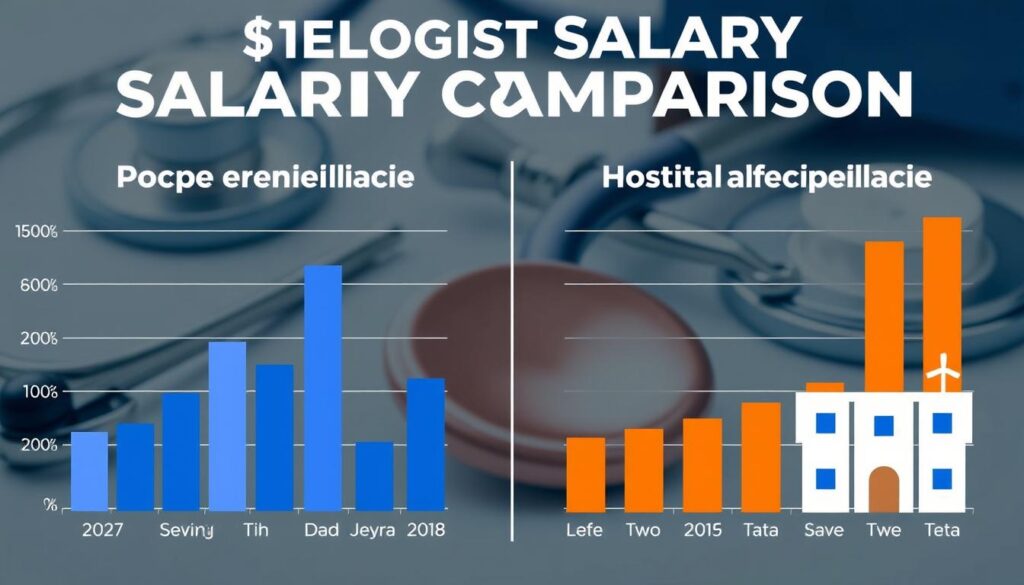Discover comprehensive insights into anesthesiologist salary trends, factors affecting earnings, and career prospects. Learn what impacts your potential income in this rewarding field.
Anesthesiologists earn an impressive average of $439,200 a year in 2025. This high pay shows how crucial they are in healthcare. They manage patient care during complex surgeries, let’s see anesthesiologist salary.
The salary for anesthesiologists is both dynamic and promising. Your earnings can be between $327,057 and $551,343 a year. This depends on your experience, where you work, and your specialty. To understand an anesthesiologist’s yearly income, you need to know the profession’s unique aspects.
Anesthesiologist pay is more than just a number. It reflects their huge responsibility and specialized skills in patient care. They handle pain and ensure patient safety during surgery. Anesthesiologists are key healthcare workers.
Key Takeaways
- Average annual anesthesiologist salary reaches $439,200 in 2025
- Salary ranges vary widely from $327,057 to $551,343
- Compensation depends on experience, location, and specialization
- Top-paying states include California and New York
- Advanced degrees significantly impact earning potential
Understanding the Role of an Anesthesiologist
Anesthesiologists are key in healthcare, making sure patients are safe and comfortable during surgeries. They do more than just give medicine. With over 51 million surgeries a year in the U.S., their role is vital.
Key Responsibilities and Specializations
Anesthesiologists have many important jobs that affect patient care:
- Evaluate patient medical history and assess surgical risks
- Determine appropriate anesthesia protocols
- Monitor vital signs during surgical procedures
- Manage patient pain and recovery
- Collaborate with surgical teams
Educational Requirements and Training
To become an anesthesiologist, you need a lot of education and training. Knowing how much they make helps understand their hard work and dedication.
| Educational Stage | Duration |
|---|---|
| Pre-med Bachelor’s Degree | 4 years |
| Medical School | 4 years |
| Anesthesiology Residency | 4 years |
| Optional Specialty Fellowship | 1 year |
Work Environment and Schedule
Anesthesiologists work in many places, like hospitals and private clinics. Their jobs can be tough, with long hours and being on call. Being flexible and having stamina are important for this job.
“An anesthesiologist’s work is a blend of scientific precision and compassionate care.” – Medical Professional Association
Current State of Anesthesiologist Salary
Looking into how much anesthesiologists make shows a fascinating picture of medical pay in 2024. These doctors earn an average of $439,200 a year. This makes their salary one of the highest in healthcare.
Exploring the anesthesiologist salary gives us interesting facts:
- Average monthly earnings: $36,600
- Weekly pay range: $7,317 to $9,575
- Hourly wage: $157 to $265
Experience greatly affects how much they earn. New anesthesiologists start at about $412,806. They can see big increases in pay as they gain more experience:
- Entry-level: $412,806
- Mid-level (1-2 years): $417,157
- Senior-level (5-8 years): $427,599
- Expert-level (8+ years): $440,658
“The medical profession rewards expertise, and anesthesiology is no exception to this rule.” – Healthcare Compensation Review
Where they work also affects their pay. Cities like San Jose ($551,200), San Francisco ($549,000), and New York ($513,000) pay the most. This shows how location can change an anesthesiologist’s salary.
Geographic Salary Variations Across the United States
Exploring the anesthesiologist salary landscape shows big regional differences. Where you work greatly affects your income. Your earnings can change a lot depending on the state and whether you’re in a city or rural area.
Top-Paying States for Anesthesiologists
California is at the top with great pay. Other high-paying states include:
- California: Average annual salary up to $445,200
- New York: Potential earnings around $414,300
- New Jersey: Salaries reaching $408,700
- Connecticut: Competitive rates at $407,200
Urban vs Rural Compensation Differences
Your salary can change based on where you work. Cities usually pay more because of higher living costs and complex medical settings. Rural areas might have lower base salaries but offer bonuses or housing help.
Cost of Living Adjustments
Think about the cost of living when looking at salaries. A high salary in an expensive city might not go as far as a lower salary in a cheaper area.
“Location isn’t just a detail—it’s a crucial factor in your financial landscape as an anesthesiologist.” – Healthcare Compensation Expert
Do your homework on regional pay trends. This helps you make career choices that fit your financial and lifestyle goals.
Factors Influencing Anesthesiologist Pay
Figuring out how much anesthesiologists make involves looking at several important factors. Their pay isn’t just a fixed amount. It changes based on different key elements.
The main things that affect anesthesiologist pay include:
- Professional Experience: As doctors get more experience, their pay goes up. Those with 10+ years can earn up to 40% more than new doctors.
- Subspecialty Expertise: Having special skills in areas like cardiac or pediatric anesthesiology can really increase what you can earn.
- Geographic Location: Pay varies by state and region.
- Employment Setting: Working in a hospital, private practice, or locum tenens positions can affect your pay differently.
Getting more certifications and training can also boost your pay. The median salary for anesthesiologists is $338,275. But, your earnings can change based on these important factors.
“Specialization and continuous professional development are key to maximizing earning potential in anesthesiology.” – Medical Career Insights
Getting certified in areas like pain management or critical care can really increase your salary. The need for healthcare, especially in areas that don’t have enough doctors, also means you can earn more.
Experience-Based Salary Progression
Understanding how an anesthesiologist’s salary grows is key to planning your financial future. As they gain more experience, their earnings skyrocket. This is due to their growing expertise in their field.
Entry-Level Earnings
At the start of your career, your salary reflects your initial training and limited experience. Anesthesiologists typically earn between $275,000 and $290,000 a year at this stage. Your salary can vary based on location, the healthcare institution, and specialized training.
- Starting salary range: $275,000 – $290,000
- Factors influencing initial compensation:
- Geographic location
- Healthcare facility type
- Specialized training
Mid-Career Compensation
With 5-10 years of experience, your salary becomes more competitive. At this point, you can earn around $320,000 to $340,000 a year. Your salary increases with more certifications and subspecialty expertise.
Senior-Level Salary Ranges
Experienced anesthesiologists with over 10 years of experience earn impressive salaries. They can make between $375,000 and $425,000 a year. Your salary at this stage is influenced by your expertise, reputation, and leadership roles.
| Career Stage | Experience Years | Salary Range |
|---|---|---|
| Entry-Level | 0-2 years | $275,000 – $290,000 |
| Mid-Career | 5-10 years | $320,000 – $340,000 |
| Senior-Level | 10+ years | $375,000 – $425,000 |
“Your earning potential in anesthesiology grows exponentially with experience and specialized skills.” – Healthcare Compensation Experts
Private Practice vs Hospital Employment Earnings
Choosing between private practice and hospital employment greatly affects anesthesiologists’ pay. Each option has its own financial pros and cons for doctors.

Knowing the financial details is key to making a smart career choice. Let’s look at the main pay differences:
- Hospital Employment: Stable salaries with comprehensive benefits
- Private Practice: Higher potential earnings with increased administrative responsibilities
- Locum Tenens: Flexible positions with potentially higher hourly rates
Recent data shows interesting pay insights for anesthesiologists in different settings:
| Practice Setting | Average Annual Compensation | Income Characteristics |
|---|---|---|
| Single-Specialty Private Practice | $358,000 | Higher autonomy, more variable income |
| Hospital Employment | $339,000 | Stable salary, consistent benefits |
| Outpatient Clinics | $278,000 | Lower compensation, more predictable schedule |
Pro Tip: Self-employed doctors make an average of $374,000 a year. Employed doctors make $344,000. The main difference is in how they get paid and the work they do.
“Your career path determines not just your salary, but your professional satisfaction.” – Medical Career Insights
Interestingly, over 46% of doctors say more than half their income is from salary. Only 25.6% of private practice owners say the same.
When thinking about anesthesiologist pay, remember extra pay for work done. This can increase your earnings based on how much you work.
Impact of Subspecialties on Earning Potential
Choosing a subspecialty can greatly affect an anesthesiologist’s salary. General anesthesiology offers a good income. But, specialized areas can lead to higher earnings and unique career paths.
Subspecialties are key in determining an anesthesiologist’s yearly income. Each area brings its own financial benefits and career growth chances.
Pediatric Anesthesiology
Pediatric anesthesiologists are trained to work with children. This demanding field requires great skill and precision. Their salaries are often higher because of the complex care needed for young patients.
- Advanced certification in pediatric anesthesia
- Specialized training in child-specific medical protocols
- Potentially higher compensation for specialized expertise
Cardiac Anesthesiology
Cardiac anesthesiologists work with patients having heart surgeries. Their work with high-risk patients earns them premium pay. They are crucial in complex heart procedures, affecting their earnings.
“Cardiac anesthesia requires extraordinary precision and advanced medical knowledge” – Dr. Michael Roberts, Cardiovascular Anesthesiology Expert
Pain Management
Pain management specialists treat chronic pain. This field offers more predictable hours and can increase an anesthesiologist’s income.
- Additional fellowship training required
- Potential for private practice opportunities
- Growing demand for chronic pain management
Your choice of subspecialty greatly affects your salary. Strategic specialization leads to better career and financial opportunities.
Benefits and Compensation Packages
When looking at anesthesiologist pay, it’s key to see the whole picture. Your earnings go beyond just a base salary. They include many benefits that boost your financial health.
Anesthesiologists get a package that usually includes:
- Base salary ranging from $439,200 to $497,900 annually
- Performance-based bonuses averaging $28,900
- Signing bonuses up to $1,375
- Educational allowances of $1,180 per year
- Housing stipends up to $10,000 annually
How much an anesthesiologist makes also depends on other factors:
| Benefit Category | Estimated Value |
|---|---|
| Social Security Benefits | $17,241 (2.9% of total compensation) |
| Paid Time Off | $66,614 (11.3% of total compensation) |
| Total Compensation | $591,441 |
Employers also offer extra perks like:
- Malpractice coverage at no cost
- 20 working vacation days annually
- 4 wellness days
- Free parking
- Confidential counseling services
A competitive compensation package reflects not just salary, but the total value of professional support and financial recognition.
As you grow in your anesthesiology career, your pay will change. Newbies start at about $412,806. Those with over 8 years of experience can earn up to $440,658.
Industry Trends Affecting Anesthesiologist Salaries
The field of anesthesiology is changing fast. Several trends could affect how much anesthesiologists earn. Knowing these changes can help doctors plan their careers better.

Healthcare Policy Transformations
Changes in healthcare policy are big news for anesthesiologist salaries. New care models focus on better patient results. This means anesthesiologists might need to change how they work and get paid.
- Increased focus on patient safety metrics
- Performance-based reimbursement strategies
- Enhanced documentation requirements
Technological Advancements Reshaping Practice
New tech is changing how anesthesiologists do their jobs. Tools like telemedicine and digital platforms open up new ways to earn. Doctors who use these technologies could see their pay go up.
“Technology is not just changing how we practice medicine, but how we get compensated for our expertise.” – Dr. Sarah Rodriguez, Anesthesiology Technology Expert
| Technology Impact | Potential Salary Influence |
|---|---|
| Telemedicine Platforms | +5-10% Earning Potential |
| AI-Assisted Monitoring | Increased Efficiency |
| Remote Consultation Tools | Expanded Geographic Reach |
There’s a big need for anesthesiologists because of a shortage and older patients. This means good salaries for those in this field, especially in areas that need them most.
Anesthesiologists who keep up with new tech can find great opportunities. This makes the field exciting and rewarding for those who adapt.
Career Growth and Advancement Opportunities
Being an anesthesiologist opens up many chances for growth. The job outlook is bright, with many ways to boost your skills and pay.
Your path can lead in several exciting ways:
- Leadership roles in hospital departments
- Academic research and teaching positions
- Specialized surgical subspecialties
- Hospital administration
- Private practice entrepreneurship
Knowing how much anesthesiologists earn can depend on your specialization. Getting better at areas like pediatric or cardiac anesthesiology can really increase your value.
“Continuous learning and specialization are key to career success in anesthesiology.” – American Society of Anesthesiologists
Here are some tips for moving up in your career:
- Pursue additional certifications
- Engage in cutting-edge research
- Develop leadership skills
- Network with professional organizations
| Career Path | Potential Salary Increase |
|---|---|
| Academic Research | 15-25% above base salary |
| Hospital Leadership | 20-35% additional compensation |
| Subspecialty Expertise | 30-50% higher earnings |
By focusing on your growth, you can make your anesthesiology career both rewarding and profitable.
Future Outlook for Anesthesiologist Salary
The medical field is always changing, offering great chances for anesthesiologists. Knowing how much anesthesiologists will make in the future helps them plan their careers well.
Projected Demand Through 2025
The healthcare world expects a big increase in anesthesiologists’ jobs. This growth comes from several important reasons:
- An older population needing more surgeries
- New medical technologies
- More complex medical procedures
Salary Growth Predictions
Experts say anesthesiologists will see good financial gains. They predict:
- Salary increases of 2-3% each year
- Salaries ranging from $285,000 to $365,000 annually
- Different pay based on where you work
“The future of anesthesiology looks bright, with strong demand and good pay,” says a top healthcare analyst.
Things that affect anesthesiologist pay include their skills, where they work, and the demand for their services. Staying up-to-date with your skills can lead to higher earnings.
New areas like pain management and cardiac anesthesiology can also boost your income. Your dedication to learning and growing will be key to reaching your career goals.
Conclusion
Thinking about a career in anesthesiology? The outlook is bright. Anesthesiologists can earn an average of $408,000 by 2025. The job market is growing at a steady 4% from 2020 to 2030, offering stable jobs across the country.
The job outlook is promising for those who keep learning and specializing. Most anesthesiologists, 85%, are board certified. This means you can grow your career with extra training. Knowing your salary depends on your specialty, where you work, and how much you learn.
Choosing the right path can boost your career. You might work in hospitals, which hire 64% of anesthesiologists, or try being your own boss. With a 3% annual salary increase, anesthesiology is a great choice for long-term success and financial growth.
Success in anesthesiology needs hard work, constant learning, and being open to change. Keep up with new tech, get and keep certifications, and understand the changing healthcare world. This way, you can reach your full potential in this rewarding field.


